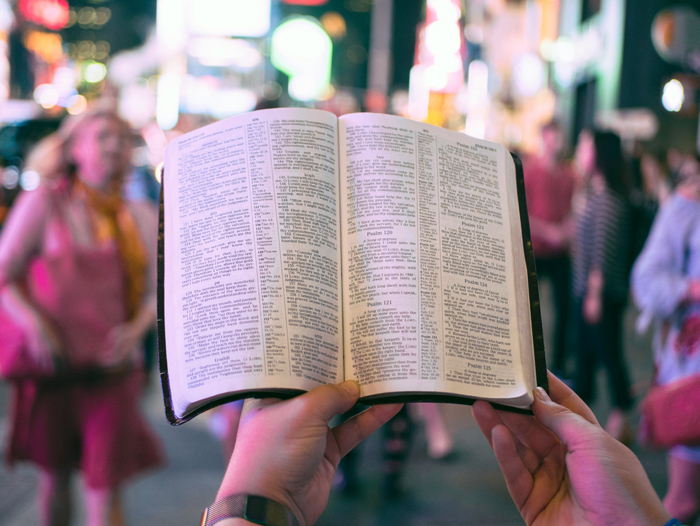
|
This is a non-WLC article. When using resources from outside authors, we only publish the content that is 100% in harmony with the Bible and WLC current biblical beliefs. So such articles can be treated as if coming directly from WLC. We have been greatly blessed by the ministry of many servants of Yahuwah. But we do not advise our members to explore other works by these authors. Such works, we have excluded from publications because they contain errors. Sadly, we have yet to find a ministry that is error-free. If you are shocked by some non-WLC published content [articles/episodes], keep in mind Proverbs 4:18. Our understanding of His truth is evolving, as more light is shed on our pathway. We cherish truth more than life, and seek it wherever it may be found. |
I remember the first time I talked to a software developer about their day-to-day job. I remember it because I didn’t understand any words from their mouth.

Have you ever had an experience like that with someone? It typically happens when we talk to people in positions that require significant amounts of education and training — doctors, electricians, chemical engineers, financial advisors, etc.
They start telling you about what they do on a typical day, and you leave the conversation having no idea what they do on an average day. Why? Because they might as well have been speaking a different language.
Many Christians have had a similar experience trying to read the book of Revelation. For most of us, it makes no difference that John’s writing has been translated from Greek into English. Though technically readable, the actual words on our pages seem far from understandable. There’s an additional language barrier for us modern readers that isn’t fully solved by our English translations. We can read terms like “the four horsemen,” “bowls of wrath,” or “a beast rising out of the sea,” but do we know what they mean? Have you ever felt this way?
Well, if it feels like you’re reading a different “language” when you read the book of Revelation, it’s because you are. It’s the language John knows best (besides Greek), the language of “Bible.”
Authors of the New Testament — men like John — were specialists in their own right, just like doctors, engineers, and accountants. But their education and training weren’t in spreadsheets, surgery, or stocks. It was in the Bible. It’s hard for us to imagine today, but an author like John would have had large chunks of his Bible (what we call the “Old Testament”) memorized.
In an age in which “paper” wasn’t a thing yet, much less mass publishing, the words of Scripture were regularly read aloud and committed to memory in the Jewish and Christian communities. These families didn’t have copies upon copies of the Bible at their homes like we do. If you wanted to know the Bible, you had to memorize it when you heard it read aloud.
Here’s why this is so important when it comes to how you and I read the book of Revelation: If John knew his Bible like the back of his hand, and if John wrote to communities that would have also learned their Bibles well, what do you think he would expect of modern readers? That’s right. Get to know your Bibles!
The most helpful tool in interpreting Revelation is not the New York Times, Fox News, The Economist, or (pick your media outlet of choice); it’s your Bible.
Let me prove it to you with some math. There are 404 total verses in Revelation. Now, out of those 404 verses, guess how many references John makes to the Old Testament…
I’m serious; try to think of a number. Got one?
Scholars differ on the exact number, but all agree that at least 500 references to the Old Testament are in the Book of Revelation.
If you’re keeping count at home, that’s more than one reference per verse. When I said John lives, breathes, and dreams Bible, I meant it. He’s like that friend who can’t stop quoting their favorite movie.
Lines from the film are so deep inside them that quotes, and references just naturally make their way into everyday speech. John is very similar to that friend, except he doesn’t offer direct quotes from the Old Testament. He uses words, phrases, and hints. He’s a subtle composer, always pointing our attention back to the grand drama that Revelation completes. And he expects us to be familiar with his source material, the Old Testament. For example:
 What does this mean for readers who don’t know their Old Testament as well as the first Christians to whom John wrote?
What does this mean for readers who don’t know their Old Testament as well as the first Christians to whom John wrote?
For starters, it means that we should get to know our Old Testaments. Unfortunately, some Christians see — and have even been taught that — the Old Testament is merely one long, tedious, legalistic introduction to the more exciting and grace-filled New Testament. Nothing could be further from the truth. Just look at what Yahushua had to say about it (Matthew 5v17).
Far from being a boring introduction, the Old Testament contains the characters, setting, and plotline for the grand drama that Yahushua saw himself fulfilling. And Revelation is this drama’s grand finale.
In it, John reintroduces the main characters in new costumes, adds some trumpets to the bridge of the song, and even builds out the final set piece in Revelation 21-22: the new heavens and new earth.
All of this presupposes that the reader is familiar with the first several acts of the drama.
So, where do we start?
If we don’t have the Old Testament memorized and feel like we’re starting at ground zero, are there any steps we can take toward understanding the acts of the drama that come before Revelation? Yes. Read your entire Bible before reading Revelation.
Okay, if you don’t have time for that, here are two of John’s favorite Old Testament references that, if you study them, will help you grasp the grand, epic finale that is Revelation.
Exodus 7-11: The ten plagues are the backdrop for most of the judgment we find in Revelation. As you go back and study the plagues, ask yourself, “What was the purpose? What was Yahuwah hoping to accomplish, and did he accomplish it?” Then, as you read the cycles of judgment in Revelation 6-16 (a lot of judgment), ask yourself the same questions: “What is the purpose? What is Yahuwah hoping to accomplish? And does he accomplish it?”
“You get out what you put in,” and it’s no different with our study of the Bible.
|
Daniel 7: Daniel was probably John’s favorite book, and it contains one of the most critical chapters in the Old Testament: Daniel 7. In it, we see visions of beasts, empires, and ungodly rulers on the earth. John is tracking with all this when he writes about the mega-beast in Revelation 13. If you’re to read only one Old Testament book that will help you understand Revelation, look no further than Daniel. As you read, ask yourself, “What do the beasts represent?”
The first time I talked to that software developer wasn’t the last time I spoke with one. I worked at a job that required me to talk to developers regularly. Do you know what eventually happened? I could hear one of them say something like “JavaScript” and not have to Google it. Their lingo became mine (kind of).
Hopefully, as you dive into these Old Testament chapters, Revelation will feel less and less like a foreign language and more and more like your second language. There’s an old cliché that goes something like, “You get out what you put in,” and it’s no different with our study of the Bible.
Trust me, I realize – and readily admit – that this is hard work. But this hard work will, I believe, lead to fruitful reading and faithful participation in the grand drama that is the story of the Bible.

This is a non-WLC article by Blake Zimmerman.
We have taken out from the original article all pagan names and titles of the Father and Son, and have replaced them with the original given names. Furthermore, we have restored in the Scriptures quoted the names of the Father and Son, as they were originally written by the inspired authors of the Bible. -WLC Team